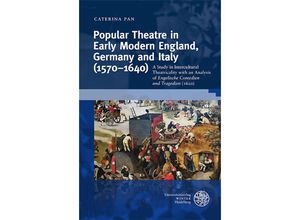This study explores the influence of English and Italian itinerant companies on early modern
German theatre. A central aspect that mediated this intercultural adaptation is 'popular
culture' i.e. a network of shared knowledge which was successfully employed by the English
Comedians to meet and shape the taste of their audiences. The analysis of the first and most
important collection of playtexts attributed to them Engelische Comedien und Tragedien (1620)
according to four parameters ('Memorialisation' 'Hybridisation' 'Adaptation' '
Visualisation') shows clear influences both from Elizabethan drama and Commedia dell'Arte and
offers an innovative transversal perspective on the development of early modern popular theatre
in Germany and Austria as a product of intercultural theatricality.



